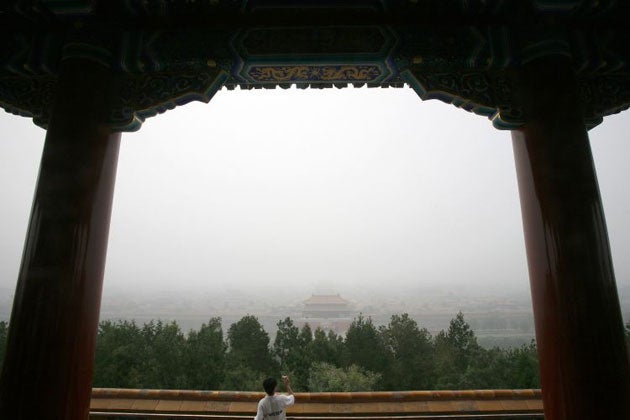Beijing losing battle against Olympic smog

Your support helps us to tell the story
From reproductive rights to climate change to Big Tech, The Independent is on the ground when the story is developing. Whether it's investigating the financials of Elon Musk's pro-Trump PAC or producing our latest documentary, 'The A Word', which shines a light on the American women fighting for reproductive rights, we know how important it is to parse out the facts from the messaging.
At such a critical moment in US history, we need reporters on the ground. Your donation allows us to keep sending journalists to speak to both sides of the story.
The Independent is trusted by Americans across the entire political spectrum. And unlike many other quality news outlets, we choose not to lock Americans out of our reporting and analysis with paywalls. We believe quality journalism should be available to everyone, paid for by those who can afford it.
Your support makes all the difference.With 10 days to go until the Beijing Olympics opens, the smog simply refuses to lift and the Games organisers are preparing emergency measures to clear the air ahead of the big day.
The traffic on the streets of Beijing is noticeably lighter, and many of the big steelworks and coal-fired power stations have been silenced. But the capital was still enveloped yesterday in a haze that restricted visibility to a couple of hundred yards.
For years the authorities have been trying to clear the yellow-tinged smog masking the city, including a recent batch of measures as a quick-fix solution. "We will implement an emergency plan 48 hours in advance if the air quality deteriorates," Li Xin, a senior engineer with the environmental bureau, told the China Daily newspaper.
It is only a week since the government introduced an odd-even number plate system which bars more than one million of Beijing's 1.3 million passenger cars from the streets. Now the government is considering banning 90 per cent of private cars and closing more factories as a last-ditch attempt clear the skies before the games start on 8 August. Beijing has already spent 120bn yuan (£8.9bn) on tackling the pollution, to no avail.
The authorities say the haze was normal for Beijing for a balmy late July and had nothing to do with pollution. "The air quality in Beijing during the Olympic Games will not affect the health of athletes," said Du Shaozhong, deputy director of Beijing's Municipal Environmental Protection Bureau, the man charged with soothing fears that the Games may be a smoggy event. Athletes planning to bring respirators were only adding unnecessarily to their baggage weight, said Mr Du, who emphasised that the figures showed the air quality was improving: "A blue sky doesn't mean the air quality is good. If you take a shower, you can't see clearly because of the steam, but it doesn't mean it's pollution."
"We can guarantee a good environment for athletes. The International Olympic Committee and its medical commission have concluded that good air quality is fully guaranteed," Mr Du added.
However, with some athletes already training in Beijing and elsewhere in China, and others due to arrive in the coming days, the government's assurances are unlikely to assuage fears that China's promise of a "Green Games" is dead in the water.
The Olympic gold-medallist and world record holder Haile Gebrselassie of Ethiopia has pulled out of the Beijing marathon because he suffers from asthma and believes that the pollution threatens his health.
The environmentalist group Greenpeace released a report saying that Beijing's air quality was still well short of international guidelines and that levels of particulates in the air were twice as high as recommended by the World Health Organisation.
It is still not clear exactly how bad the air has to be for an event to be cancelled, and it is forbidden to bring in measuring equipment for any independent measurement of air quality.
Jacques Rogge, the head of the International Olympic Committee, has warned that poor air quality during the Games could result in the suspension of endurance races such as long-distance cycling and the marathon.
Join our commenting forum
Join thought-provoking conversations, follow other Independent readers and see their replies
Comments